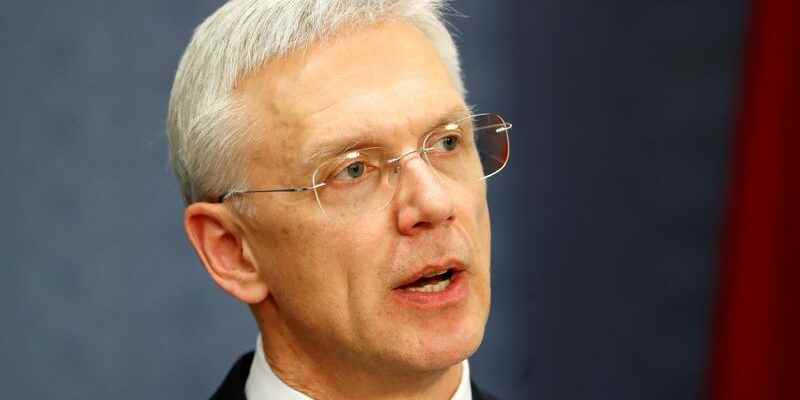by Andrius Sytas
RIGA (Reuters) – Latvian Prime Minister Krisjanis Karins’ centre-right New Unity party won Saturday’s parliamentary elections with 19% of the vote, near-final results show, which should see him lead a new coalition government.
These results, based on the counting in 96% of the constituencies, imply that Latvia should remain on the same political line as its Baltic neighbours, Estonia and Lithuania, that of the firmness of the European Union vis-à-vis Russia.
The election campaign was dominated by security issues following Russia’s invasion of Ukraine.
But the member parties of the outgoing government coalition are only expected to gather 42 seats out of 100 in Parliament, which will force Krisjanis Karins to find new allies to secure a stable majority.
Up to nine parties could win enough votes to be represented in Parliament.
“I am confident that we will be able to find a solution,” Krisjanis Karins told Reuters on Sunday, adding that he would strive to bring together a tight-knit coalition.
“What everyone has in mind, first and foremost, is how we’re going to get through the winter, not just in Latvia but across the EU, and how we’re all going to stay united behind Ukraine and not bias in the face of the difficulties we are encountering,” he added.
Before the election, the government notably restricted the conditions of entry into Latvia of Russian nationals arriving from Russia or Belarus.
Behind New Unity, the Union of Greens and Peasants, a coalition of conservative movements led by Aivars Lembergs, is credited with 13% of the vote.
Aivars Lembergs, on bail since February after appealing his 2021 corruption conviction and on a US sanctions list since 2019, said in 2014 that the presence of NATO troops on the Latvian soil amounted to occupation and he called his political opponents ‘Sorosites’, in reference to US investor George Soros.
But Greens and Peasants Union chairman Armands Krauze told Reuters on Sunday that his party would support Karins’ position against Russia.
“We think the current foreign policy is quite good,” he said.
The results also show a drop in support for the parties usually most popular among the Russian-speaking minority of the population, which represents around a quarter of the 1.9 million Latvians.
The left-wing Harmonie party won only 5% of the vote.
(Report Andrius Sytas and Janis Laizans, French version Marc Angrand)
